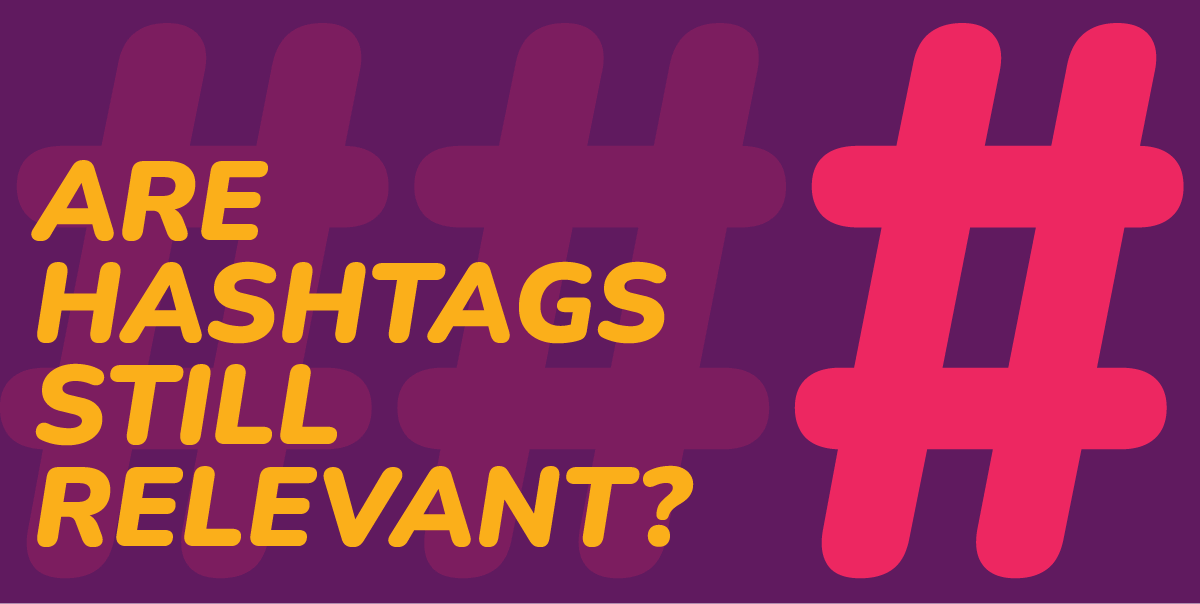
Are hashtags still relevant?
It’s hard to remember a time before the ubiquitous and humble hashtag. They’re such an online staple, it may seem like they burst out of the early days of the internet fully formed. However, hashtags weren’t used in their current form until October 2007, and in fact weren’t even called “hashtags” until a random blog post in August of that same year. Hard as it may be to believe, there was a time before the hashtag! And now, with the internet landscape changing day by day, it’s worth asking: are we now in a post-hashtag world? Are hashtags still relevant at all?
While there’s no denying that the hashtag has evolved, and best practices along with it, there are still relevant ways to use hashtags. Here’s what you need to know about the pros and cons of hashtags, and how to approach using them yourself.
Reasons to use hashtags
Hashtags can help grow your brand’s reach
Some social platforms give people the ability to follow specific hashtags. This allows them to find accounts they might be interested in that they’re not currently following. For example – let’s say you’re a company that sells pet accessories. Posting a picture of an adorable pup sticking her tongue out while wearing one of your cute bandanas and hashtagging it with #tongueouttuesday means that anyone following that hashtag (or who has liked similar content in the past) now has the opportunity to discover you.

Hashtags keep things organized
Creating a unique hashtag for your brand helps keep things unique and sorted. If the pet accessory company from before encouraged their customers to use a specific hashtag when posting about their product, that creates a library of content that can then be used to promote the brand further. No need to dig through emails and Google reviews – just search your own hashtag! For a big brand example, think #ShareACoke.
Hashtags help you participate in trends
While there are hashtags that stick around for a long time, there are also hashtags that are used for trends. Using trending hashtags is a great way to get your brand out there and make it easily discoverable. Hashtags build community, help you participate in the zeitgeist, and can generate plenty of content for you to use.
Reasons hashtags may be obsolete
Different platforms have different rules
If you’re trying to streamline your social media content and ads, you may want to skip hashtags to cut down on the work you need to do. While hashtags are still used on platforms like Instagram and LinkedIn, Facebook can sometimes frown on posts that use too many, considering them to look like spam. If you want to write one post for all platforms, it may be easier to skip hashtags entirely.

Good targeting can replace the need for hashtags
If you’re already paying top dollar for highly precise targeting on your ads, do you really need to spend more time and money researching and adding hashtags? Good targeting will net you a better ROI – hashtags might just be gravy for you. So, if you skip it, we don’t blame you.
AI is making hashtags less necessary
With the rise of AI, hashtags are not as important as they once were, since computers have gotten very good at identifying and categorizing content. Of course, we have yet to fully see how this will shake out – but it’s entirely possible that one day, AI will have replaced the need for hashtags.
So what’s the deal – have reports of the hashtag’s death been greatly exaggerated? Or are they deader than disco? As usual, nuance is necessary here. While they might not be quite the ubiquitous powerhouse they once were, hashtags can still get positive results with only a little effort. Here’s how.
Best practices for using hashtags
Keep it short and sweet
Long gone are the days when platforms rewarded long paragraphs filled with nothing but every possible relevant hashtag. It’s unpleasant for the user and can make your post look spammy. Hootsuite and SocialPilot recommend 2-3 hashtags per post, others recommend 4. We think that range has the perfect balance – enough to get some value from their use, but not so many that it looks like spam.
Do your research
In order to pick the most appropriate hashtags, spend some time researching. What hashtags are your competition using? Who is your audience? What are they interested in? What hashtags do they use? The best hashtags to use will change over time, so make a point to periodically check up on what people are using. There are tools out there that can help with this, such as TalkWalker by HootSuite.

Mix and match
To maximize your reach in as few hashtags as possible, a good rule of thumb is to use one branded hashtag (for brand awareness and organizing content), one niche hashtag (for connecting with highly engaged users), one hashtag with broad appeal (for reaching far and wide), and one location-based hashtag (for building your local presence).


